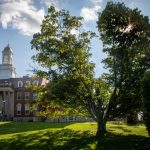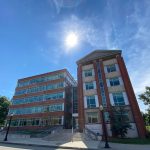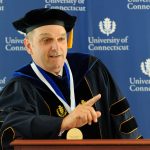Researchers from Connecticut higher education institutions are evaluating the program’s effect on attendance and other results. But interviews with families and staff members suggest a lasting impact.
On this episode, meet Del Siegle, the Lynn and Ray Neag Chair for Gifted Education and Talent Development School of Education at the University of Connecticut. Siegle is also one of the creators of the Achievement-Orientation Model, a model that explores four different elements; meaningfulness, self-efficacy, environmental perception, and self-regulation. Hear from Siegle himself about student achievement, underachievement, and the connection between the two.
A team of Neag School of Education researchers is developing a new initiative designed to help educators overcome language barriers to identify gifted students among English learners.
Meeting the growing demand for data scientists to tackle the most complex problems in society.
An interdisciplinary group of UConn researchers is leading an effort to empower high school students to become “Eco-Digital” storytellers in their communities.
UConn researchers are key members in a cross-state educational COVID-19 collaboration, co-led by Neag School associate dean Morgaen Donaldson.
Throughout the academic year, the Neag School is proud to share the latest achievements of its faculty, staff, students, and alumni. Explore their most recent promotions, awards, retirements, publications, and more: Dean’s Office Department of Curriculum and Instruction and Teacher Education Department of Educational Leadership Department of Educational Psychology Faculty/Staff Students Alumni In Memoriam Dean’s […]
Patricia “Pat” Jepson’s history with UConn spans several decades – from her time as a high school student to her retirement in 2017. Throughout her career, Jepson worked to promote excellence and diversity in Connecticut’s agricultural education programs – a commitment she maintains even now. As a student at Wilson High School (now Middletown High School), Jepson was involved in her school’s agriculture program and took UConn co-op credits. Jepson, a first-generation college student, went on to study animal science at UConn.
Patricia “Pat” Jepson’s history with UConn spans several decades – from her time as a high school student to her retirement in 2017. Throughout her career, Jepson worked to promote excellence and diversity in Connecticut’s agricultural education programs – a commitment she maintains even now.
This fall, the Neag School welcomes its incoming hires, congratulates existing faculty members on new appointments, and gives thanks to retirees






